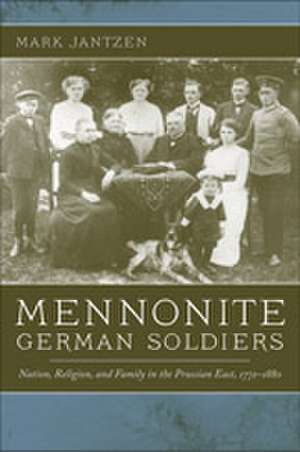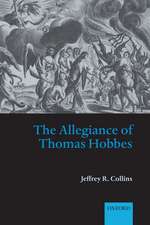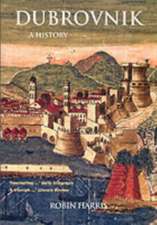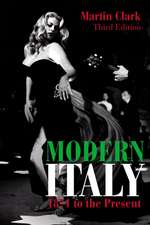Mennonite German Soldiers – Nation, Religion, and Family in the Prussian East, 1772–1880
Autor Mark Jantzenen Limba Engleză Paperback – 14 oct 2010
Mennonite German Soldiers traces the efforts of a small, pacifist, Christian religious minority in eastern Prussia--the Mennonite communities of the Vistula River basin--to preserve their exemption from military service, which was based on their religious confession of faith. Conscription was mandatory for nearly all male Prussian citizens, and the willingness to fight and die for country was essential to the ideals of a developing German national identity. In this engaging historical narrative, Mark Jantzen describes the policies of the Prussian federal and regional governments toward the Mennonites over a hundred-year period and the legal, economic, and social pressures brought to bear on the Mennonites to conform. Mennonite leaders defended the exemptions of their communities' sons through a long history of petitions and legal pleas, and sought alternative ways, such as charitable donations, to support the state and prove their loyalty. Faced with increasingly punitive legal and financial restrictions, as well as widespread social disapproval, many Mennonites ultimately emigrated, and many others chose to join the German nation at the cost of their religious tradition.
Jantzen tells the history of the Mennonite experience in Prussian territories against the backdrop of larger themes of Prussian state-building and the growth of German nationalism. The Mennonites, who lived on the margins of German society, were also active agents in the long struggle of the state to integrate them. The public debates over their place in Prussian society shed light on a multi-confessional German past and on the dissemination of nationalist values.
"What happens when a state acquires a population that is economically valuable but religiously undesirable? Mark Jantzen has opened up new territory with his absorbing study of a classic case, the Mennonites of the Vistula Delta in the century between the partition of Poland and the first decade of Bismarck's Reich. Mennonite German Soldiersundermines more than one Sonderweg and joins the pioneering work of Benjamin Nathans and Robert Crews (Russia), Selim Deringil and Fikret Adanir (Ottoman Empire), and Mack Walker and Helmut Walser Smith (Germany) in transforming our understanding of minority-majority relations in a multi-religious environment. Crisply written and deeply researched, it should be required reading for graduate seminars in Europe's long nineteenth century, and offers surprises to scholars working in German, Polish, Russian, and Jewish history." --Margaret Lavinia Anderson, University of California, Berkeley
"Mennonite German Soldiers engages several fundamental themes in Prussian/German history through the transition from early modern to the modern era. This regional study of eastern Prussia focuses on the Mennonites, a fairly small religious minority, and the author clearly intends the story to be a microcosm for engaging more basic themes, such as the rise of German nationalism; the intersection of church/state in modern Europe; the role of the gender/family in state formation; the conflicted emergence of liberal politics. Similar variations of this story have been told before--focusing on the Jewish Catholic experience--but this is the first book-length study that focuses on a Christian minority group with the debate over military service central to its argument." --John D. Roth, Goshen College
"Based on extensive and exacting research, Jantzen shows in intricate detail how Mennonite attitudes toward the military draft changed over time, and how these changing attitudes reshaped the fundamental fabric of the Mennonite community. Through this prism, Jantzen also illuminates fundamental questions of modern nationalism and the connections between nationalism, religion, and everyday life." --Helmut Walser Smith, Vanderbilt University
Jantzen tells the history of the Mennonite experience in Prussian territories against the backdrop of larger themes of Prussian state-building and the growth of German nationalism. The Mennonites, who lived on the margins of German society, were also active agents in the long struggle of the state to integrate them. The public debates over their place in Prussian society shed light on a multi-confessional German past and on the dissemination of nationalist values.
"What happens when a state acquires a population that is economically valuable but religiously undesirable? Mark Jantzen has opened up new territory with his absorbing study of a classic case, the Mennonites of the Vistula Delta in the century between the partition of Poland and the first decade of Bismarck's Reich. Mennonite German Soldiersundermines more than one Sonderweg and joins the pioneering work of Benjamin Nathans and Robert Crews (Russia), Selim Deringil and Fikret Adanir (Ottoman Empire), and Mack Walker and Helmut Walser Smith (Germany) in transforming our understanding of minority-majority relations in a multi-religious environment. Crisply written and deeply researched, it should be required reading for graduate seminars in Europe's long nineteenth century, and offers surprises to scholars working in German, Polish, Russian, and Jewish history." --Margaret Lavinia Anderson, University of California, Berkeley
"Mennonite German Soldiers engages several fundamental themes in Prussian/German history through the transition from early modern to the modern era. This regional study of eastern Prussia focuses on the Mennonites, a fairly small religious minority, and the author clearly intends the story to be a microcosm for engaging more basic themes, such as the rise of German nationalism; the intersection of church/state in modern Europe; the role of the gender/family in state formation; the conflicted emergence of liberal politics. Similar variations of this story have been told before--focusing on the Jewish Catholic experience--but this is the first book-length study that focuses on a Christian minority group with the debate over military service central to its argument." --John D. Roth, Goshen College
"Based on extensive and exacting research, Jantzen shows in intricate detail how Mennonite attitudes toward the military draft changed over time, and how these changing attitudes reshaped the fundamental fabric of the Mennonite community. Through this prism, Jantzen also illuminates fundamental questions of modern nationalism and the connections between nationalism, religion, and everyday life." --Helmut Walser Smith, Vanderbilt University
| Toate formatele și edițiile | Preț | Express |
|---|---|---|
| Paperback (1) | 362.32 lei 6-8 săpt. | |
| MR – University of Notre Dame Press – 14 oct 2010 | 362.32 lei 6-8 săpt. | |
| Hardback (1) | 699.76 lei 6-8 săpt. | |
| MR – University of Notre Dame Press – 29 sep 2022 | 699.76 lei 6-8 săpt. |
Preț: 362.32 lei
Nou
Puncte Express: 543
Preț estimativ în valută:
69.33€ • 72.58$ • 57.37£
69.33€ • 72.58$ • 57.37£
Carte tipărită la comandă
Livrare economică 07-21 aprilie
Preluare comenzi: 021 569.72.76
Specificații
ISBN-13: 9780268032692
ISBN-10: 0268032696
Pagini: 384
Ilustrații: 9 halftones
Dimensiuni: 153 x 227 x 25 mm
Greutate: 0.59 kg
Ediția:1st Edition
Editura: MR – University of Notre Dame Press
ISBN-10: 0268032696
Pagini: 384
Ilustrații: 9 halftones
Dimensiuni: 153 x 227 x 25 mm
Greutate: 0.59 kg
Ediția:1st Edition
Editura: MR – University of Notre Dame Press
Notă biografică
Mark Jantzen is associate professor of history at Bethel College, North Newton, Kansas. He is coeditor, with John D. Thiesen, of H. G. Mannhardt's The Danzig Mennonite Church: Its Origin and History, 1569-1919.














